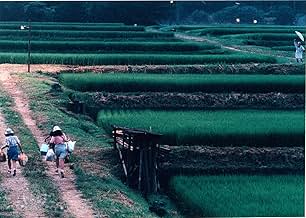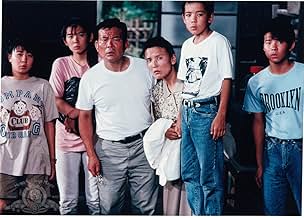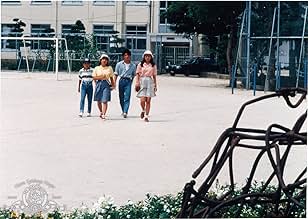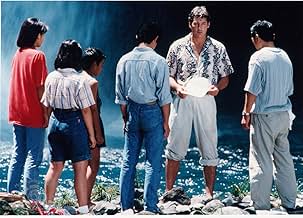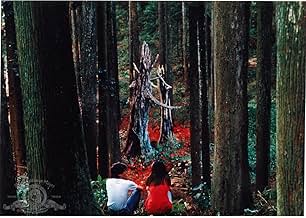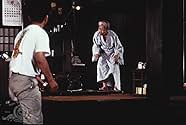IMDb रेटिंग
7.2/10
8 हज़ार
आपकी रेटिंग
अपनी भाषा में प्लॉट जोड़ेंThree generations' responses to the atomic bombing of Nagasaki.Three generations' responses to the atomic bombing of Nagasaki.Three generations' responses to the atomic bombing of Nagasaki.
- निर्देशक
- लेखक
- स्टार
- पुरस्कार
- 5 जीत और कुल 7 नामांकन
Richard Gere
- Clark
- (as Richâdo Gia)
Mieko Suzuki
- Minako
- (as Mie Suzuki)
फ़ीचर्ड समीक्षाएं
When I saw this movie, I remembered Louis-Ferdinand Celine's book, "Journey to the End of the Night", a anti-war book. Reading reviews about the movie, listening to what people in the US had to say, seeing the reaction of the American media to this movie, I was sad, simply sad. This movie is not about Japan, it's not about America, it could have been anywhere a war had happened.
This movie is a poem against war and the scars it leaves forever deep in the mind of the people who suffered those wars. Those who didn't suffer a war are lucky, and shouldn't be blamed for being this lucky, but they should see movies like this to understand what war is about. The world is never better after war. The first ones to agree to settle things through warfare are the ones who didn't suffer war. There are no winners in a war, just remember.
I'm sorry that all those who felt attacked in their pride as Americans are missing the point of this movie. If your father or your grandfather, or your friend has been to war, just listen to them.
The performance of the grandmother will make you forget you're watching a movie! It is filmed simply and un-pretentiously, though is a very emotional film.
Enjoy.
PS: Oh and I'm not Japanese...
This movie is a poem against war and the scars it leaves forever deep in the mind of the people who suffered those wars. Those who didn't suffer a war are lucky, and shouldn't be blamed for being this lucky, but they should see movies like this to understand what war is about. The world is never better after war. The first ones to agree to settle things through warfare are the ones who didn't suffer war. There are no winners in a war, just remember.
I'm sorry that all those who felt attacked in their pride as Americans are missing the point of this movie. If your father or your grandfather, or your friend has been to war, just listen to them.
The performance of the grandmother will make you forget you're watching a movie! It is filmed simply and un-pretentiously, though is a very emotional film.
Enjoy.
PS: Oh and I'm not Japanese...
I am a great fan of Kurosawa and I was so shock how bore this film was when I first saw it in theatre back in the 90s. I know Kurosawa always hide some message in his late movies and, after twenty years, I decided to rent the DVD again to examine the movie in detail. As I got into the movie, I start to understand what Kurosawa want to say. This movie is about how the younger Japanese are abandon their own culture and at the same time,ironically, it is the American, the one who dropped the atomic bomb in Japan,are reviving the Japanese tradition culture(G.Lucus and S. Spielberg are the one who produced the movie Kagamusa). Also, it is about aging as Kurosawa is part of the aging generation. Old people are being seen by young people as weak, illusions, and hopeless out of time and a burden, but when crisis came,(the storm in the movie) old people would show a trendous strength to protect the young one as the old lady in the movie standing up to the storm; it reflected that even Kurosawa, an old man, still could produces such thoughtful movie. I believe Kurosawa made this movie only for those who understand him and ,to me, this is one of his best even thought I love samurai movies.
This film feels like a story the great Akira Kurosawa wanted to tell. Four grandchildren are staying with their aged grandma outside of Nagasaki. She is a survivor of the bomb in 1945, but her husband, a teacher, perished that day. The grandmother's children are in Hawaii visiting a relative and her husband, who is played by Richard Gere in a fine understated performance. Clark (Gere) and his wife have her father living with them, and they claim he is one of Grandma's brothers, but she cannot remember him. The film becomes a mediation on the war, specifically the devastating effect on Nagasaki. In one particularly touching scene everyone gathers at the school where Grandpa perished that day in August. There is a monument there built for the children who dies there that day, a sculpture of mangled monkey bars. The film is slow moving, meditative, but moving in its best moments. While not among Kurosawa's best work (its virtually impossible to stand up to such greatness), this last film of his is a touching tribute to a part of his life (and so many others) that is both easy to forget, but also impossible not to remember. The acting is uniformly very good, especially the four children and Grandma. Recommended.
A beautiful, beautiful film. If you only know Kurosawa through Seven Samurai then this will come as something of a shock. Gentle, sensitive, moving and uplifting. The cinematography is sumptuous with plenty of touches that let you know that this is no ordinary film maker. By far the best of his later films in my opinion.
Don't be confused by the 'starring Richard Gere' tag. He only has a minor part, though he takes it well.
Just go and see it!
Don't be confused by the 'starring Richard Gere' tag. He only has a minor part, though he takes it well.
Just go and see it!
Although aware of Akira Kurosawa's standing in the realm of world cinema,I have never been a great fanatic of his films as most of them are Samurai films heavily laden with symbolic references to Japanese society.For me Akira Kurosawa's non Samurai films are better films as they speak of deeper issues like human sentiments.I watched "Rhapsody in August" directed by Akira Kurosawa film with rapt attention.As I was watching it after having watched "Madadayo",I could not help but comparing it both in style as well as content with that film.Both the films were made by Kurosawa when he was at the end of his career and may be for this reason he chose to make humanist stories.Rhapsody in August is a meaningful tale for all people whether they are young or old,American or Japanese.It is a film which shows how important a family is and how wisdom must be passed from the old to the young. Kurosawa has deftly tackled the question of Japan's Atomic bomb tragedy through plain words spoken by an old lady who tells her young grandchildren that with the passage of time all wounds are healed.Rhapsody in August tells us albeit in a non academic manner why it is important to live peacefully thereby avoiding war for the benefit of peaceful coexistence and human society.
क्या आपको पता है
- ट्रिवियाAt the top of his career from starring alongside Julia Roberts in Pretty Woman (1990), Richard Gere was earning millions of dollars per picture. Akira Kurosawa's company felt they were unable to pay his salary, to which Gere responded with "I'll work free for Kurosawa." Not wanting to take advantage of the actor, they offered him a modest sum, as well as offering to pay for all his travel expenses, including friends he wanted to bring with him to Japan while he worked. One of those friends included Cindy Crawford.
- साउंडट्रैकNobara (Heidenröslein)
Lyrics by Johann Wolfgang von Goethe (uncredited)
Music by Franz Schubert (as Shûberuto)
Performed by Hibari Jidou Gasshoudan (Hidetaka Yoshioka, Tomoko Ôtakara, Mieko Suzuki and Mitsunori Isaki)
टॉप पसंद
रेटिंग देने के लिए साइन-इन करें और वैयक्तिकृत सुझावों के लिए वॉचलिस्ट करें
- How long is Rhapsody in August?Alexa द्वारा संचालित
विवरण
बॉक्स ऑफ़िस
- US और कनाडा में सकल
- $5,16,431
- US और कनाडा में पहले सप्ताह में कुल कमाई
- $26,771
- 22 दिस॰ 1991
- दुनिया भर में सकल
- $5,17,538
- चलने की अवधि1 घंटा 38 मिनट
- रंग
- पक्ष अनुपात
- 1.85 : 1
इस पेज में योगदान दें
किसी बदलाव का सुझाव दें या अनुपलब्ध कॉन्टेंट जोड़ें


